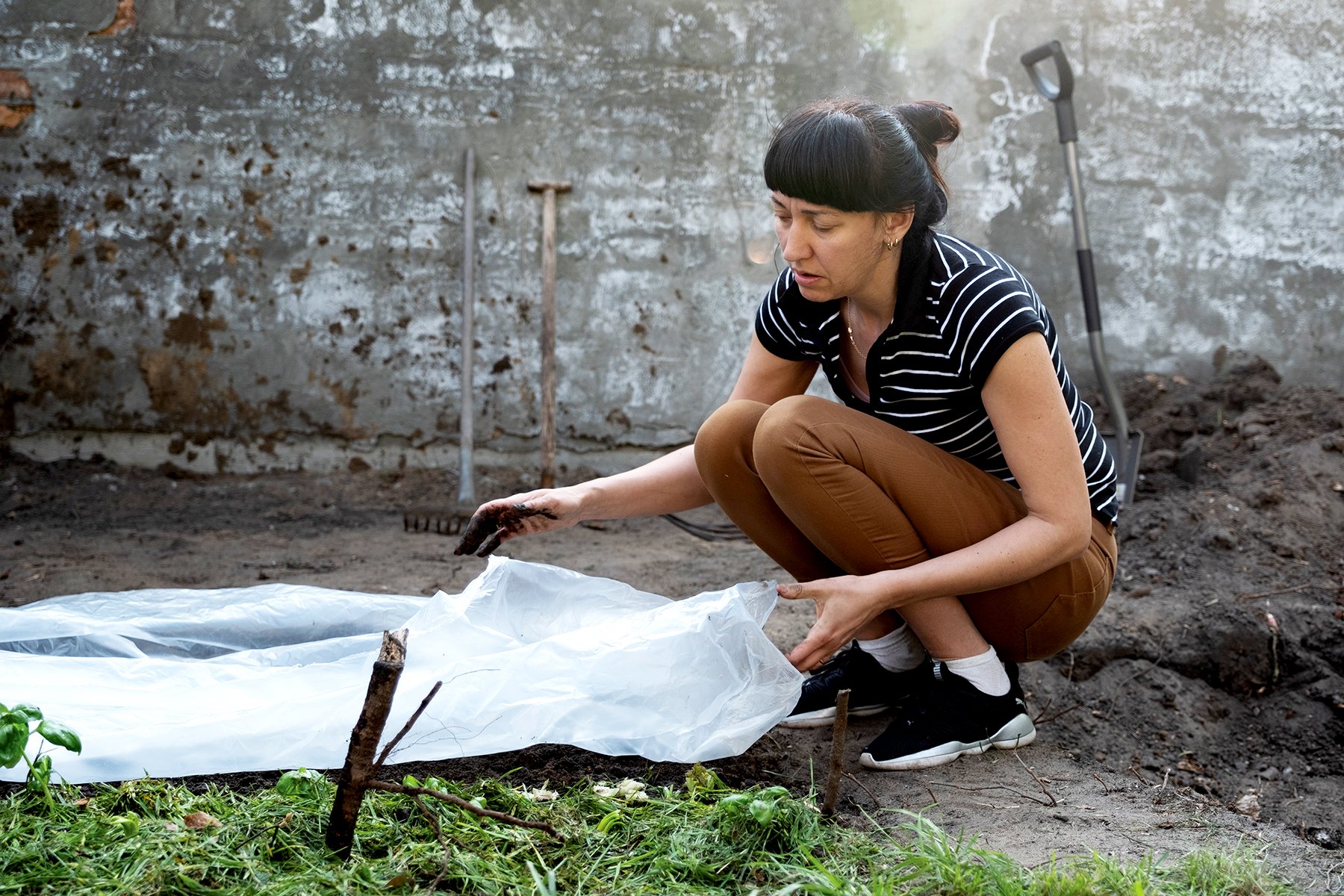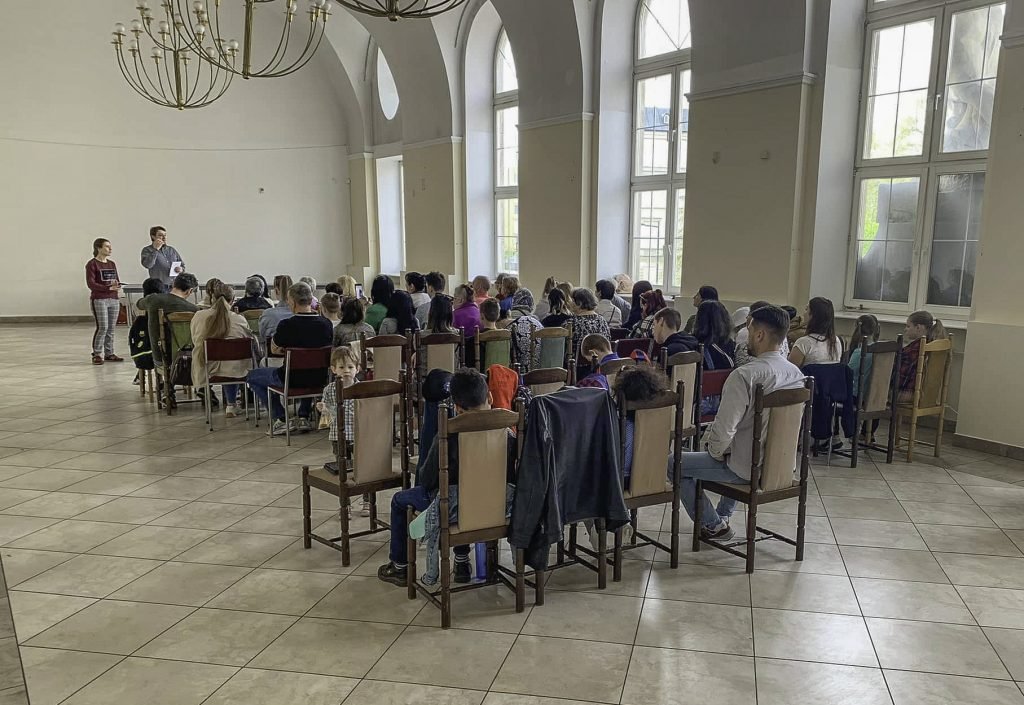Ukrainian Refugees Redefine What It Means To Be A Church
The Kościoł Chrystusowy w Warszawie (Warsaw Church of Christ) meets in a rented facility in the Polish capital. Most of its members are refugees from Ukraine. Photo provided by Warsaw Church of Christ.
WARSAW, Poland — Bizarrely, Yura Taran is thankful for all the years he abused drugs.
It was another life ago, before he became a Christian and then a minister for a Church of Christ in the eastern Ukrainian city of Zaporizhzhia.
But the poison with which he polluted himself had lingering effects. He’s not healthy enough to serve in the Ukrainian military.
Yura Taran, left, shares a room with his wife, Yulia, and their 16-year-old son, Nazar, in Warsaw. This photo was taken less than a week after they moved into the apartment. Photo by Audrey Jackson.
Neither is fellow minister Boris Sanzhura of Kramatorsk. He’s thankful for the nagging eye problem that resulted from an old injury. It’s a “thorn in the flesh,” as the apostle Paul wrote in 2 Corinthians 12. But it allowed him to cross the border with members of his congregation while other men were required to stay.
Churches of Christ provided funds for a one-year lease on this three-story duplex, with 18 rooms and four kitchens, to serve refugees from Ukraine. Photo by Erik Tryggestad.
They can’t serve their country by taking up arms. But here, they can serve their flock by taking up the cross.
“God turned what was bad into good,” Taran said.
The two ministers live among more than 50 Ukrainian refugees — most of them from Churches of Christ — in a small apartment block in Poland’s capital. Across a busy suburban street is a cemetery with a memorial for Polish soldiers who died in World War II, when Russians played the roles of liberators and occupiers in the Eastern European nation.
Churches in the U.S. helped Polish Christians secure and rent the brand-new facility for the Ukrainians. Eastern European Mission has contributed funds to help with vehicle repairs and supplies. Łukasz Kondracki, a third-generation member of the Church of Christ in Warsaw, and his wife, Nicole, help coordinate the relief effort.
On a Thursday afternoon, as workers installed an oven in an upstairs kitchen, Kondracki talked with Taran about vacuum cleaners and yard equipment — in a mix of Polish, English and Russian.
Linguistically, “we’re breaking all the rules,” Kondracki said. As for the work-in-progress facility, “They told me this doesn’t have to be a five-star hotel, but don’t be like what’s going on across the street,” he said, motioning toward the cemetery.
Anya Sanzhura, a Ukrainian refugee, covers newly planted seeds in her garden behind the duplex in Warsaw, Poland. Sanzhura became a Christian in the 1990s. Photo by Audrey Jackson.
The apartments are appreciated, said Taran’s wife, Yulia. They allow greater privacy than the refugee centers they stayed in on their journey here. In the complex’s spacious backyard, the Ukrainians are setting up a tent for devotionals and planting a vegetable garden.
Łukasz Kondracki preaches for the Kościoł Chrystusowy w Warszawie (Warsaw Church of Christ) in a rented facility. Photo provided by Warsaw Church of Christ.
Some plan to stay here for a few weeks as they look for jobs and new lives in other parts of Europe. Others wait for a chance to return home.
It’s a tough wait, Yura Taran said. They get word that things have quieted down and start to think about going back. Then they learn of a new attack.
Outside the apartment building that has become their temporary home, Ukrainian refugees celebrate the baptism of a new believer. Photo provided by Warsaw Church of Christ.
Meanwhile, the Ukrainians have revitalized the Warsaw congregation, which had dwindled to a handful of worshippers in recent years, Nicole Kondracki said. Mission efforts here have struggled, and supporting churches have pulled out. The Kondrackis plan to move to Alabama in July.
In recent weeks, church attendance has topped 60. Church members have rented an auditorium to accommodate the growing congregation of refugees.
“Church” itself has taken on a new meaning for the Ukrainians, Yura Taran said. It used to mean “sitting for two hours, singing songs and then going home.”
“We’re not doing that here. … Here, we’re in each other’s faces, at each other’s throats!” he said with a laugh. “We’re loving each other, respecting each other, trying to bless each other. And inside of us everything is calm and peaceful.
“This is our Exodus. Soon, we will find the promised land.”
This story first appeared in The Christian Chronicle. Erik Tryggestad is president and CEO of Chronicle. He has filed stories for the Chronicle from more than 65 nations.






